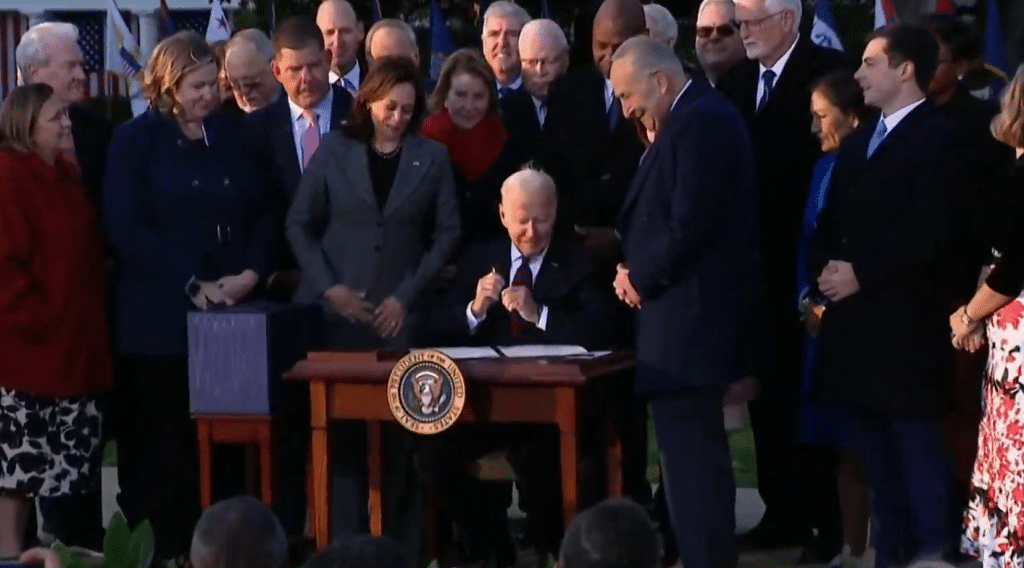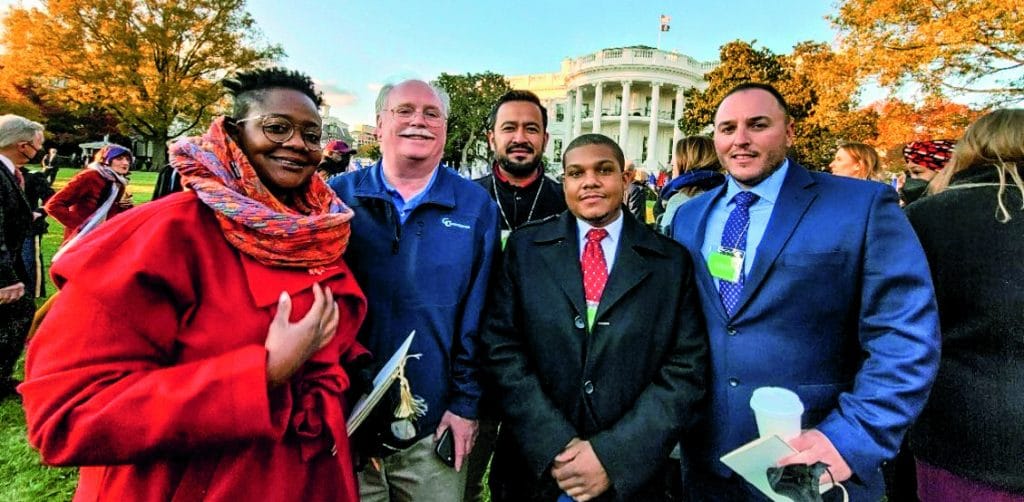
President Joe Biden signed on Nov. 15 the Infrastructure Investment and Jobs Act (IIJA) that will expand work opportunities for Union sheet metal workers rebuilding America’s schools and public buildings as well as boost U.S. passenger rail service, lead to improved safety measures for bus and transit operators and adjust how freight rail safety is handled by the Federal Railroad Administration.
The bill provides $1.2 trillion in funding for infrastructure, with a large proportion of the funding going directly to the industries SMART represents. This bill=union jobs for SMART members.
“Our union was proud to stand with President Biden today to sign this historic bill into law. It will create an unprecedented number of good, union jobs and put SMART sheet metal workers to work improving indoor air quality in our schools and in commercial and residential buildings. It also makes long-overdue railroad safety improvements and will help school districts across the country buy clean, American-made, zero-emission buses that will drive demand for the products and services provided by SMART members,” union leadership stated after the bill’s signing, which was attended by SMART General President Joseph Sellers as well as five members from across the mid-Atlantic who were invited to the ceremony. These included SMART TD D.C. Legislative Director Jarad Jackson of Local 1933 (Washington, D.C.), SMART TD Local 610 (Baltimore, Md.) Chairperson Michael Harbin, Kalima Ramsay from SM Local 100 (Washington, DC), along with fellow Local 100 members Mike Moran and Rolando Javier Montoya Garzona.

President Biden made one of his principal promises the pledge to rebuild America’s infrastructure after years of neglect. This legislation proves his Administration is delivering on this promise. However, this is only the start.
Now we’re working with his administration to implement the bill. Every SMART local must work at the local and state level to help with implementation of the bill to secure the work and make sure funding from the bill results in jobs for SMART members.
And there is the potential for even more union jobs. Another $1.75 infrastructure bill is pending that would deliver thousands of additional jobs. It’s now up to all of us to do our part to make sure Congress acts and passes this second bill quickly. America should have world-class infrastructure built by skilled union workers and it must be done quickly so the nation can catch up to its competitors on the global stage and once again set the precedent other nations follow. Text the word PASS to 67336 to let your Senators know the importance of investing in America’s workers by addressing the nation’s infrastructure. (message and data rates may apply).
Important Highlights of This Historic Infrastructure Investment and Jobs Act and How It Impacts SMART Members are Listed Below:
- Energy Efficiency & HVAC upgrades:
- $250 million to be used for energy efficiency revolving loan fund, which can be spent on indoor air quality in commercial and residential buildings.
- $50 million for an energy efficiency pilot program for non-profit buildings to conduct energy efficiency upgrades, including HVAC systems.
- $500 million for school energy efficiency that can be used to upgrade ventilation.
- $40 million for an energy audit training program to train individuals to conduct energy audits or surveys of commercial and residential buildings.
- $250 million in grants for federal buildings to improve energy performance targets.
- Electric school buses:
- $5 billion for the replacement of existing school buses with zero emission and clean school buses
- Registered apprenticeship/workforce development:
- $10 million for career skills training programs where students concurrently receive classroom instruction and on the-job training for the purpose of obtaining an industry related certification to install energy efficient buildings technologies.
- $15 million for a pilot program to restore, retrofit and construct eligible transportation facilities. The grants should employ residents impacted by the project through targeted hiring programs, in partnership with registered apprenticeship programs and contract and subcontract with disadvantaged business enterprises.
- Requires at least 5% of grants for buses and bus facilities is used for workforce development, including registered apprenticeship programs.
- $550 million for industrial research and assessment to maximize energy efficiency. Registered apprenticeship programs qualify to receive the funding.
- Transportation funding:
- $6B for Northeast Corridor Grants
- $16B for the National Network
- $36B for Fed-State Partnership for Intercity Passenger Rail, with $24B set aside for the Northeast Corridor
- $5B for CRISI
- $3B for Railroad Crossing Elimination Program
- $50M for Restoration and Enhancement
- Amtrak Reforms:
- Amtrak Mission Statement, Sec 22201: Amtrak’s mission is modified to better reflect the primary goal of providing quality service, including eliminating references to “justifying expending public money.”
- Amtrak Food and Beverage, Sec, 22208: Eliminates harmful language on food and beverage revenues that stunted growth of Amtrak on board options and sought to ultimately reduce or eliminate on board service and creates a new food and beverage working group that includes labor participation.
- Amtrak Quality Jobs, Sec 2213: Prohibits contracting out of work if employees who can perform that work are currently furloughed.
- Station Agents, Sec. 22203: Requires Amtrak to staff station agent positions at stations that receive certain levels of traffic.
- Critical Incident Stress Plans, 22424: Amtrak and commuter rail employees who are victims of assault must now be covered by critical incident stress plans, and the benefits and protections provided by such plans.
- Long Distance Trains, Sec. 22210: Increases the difficulty for Congress to eliminate a long-distance route.
- Rail Safety:
- Train Length, Sec. 22422: Requires a National Academies study on the safety of trains longer than 7,500 feet.
- FRA Reporting Requirements, Sec. 22421: requires FRA accident reports to include information on train length and number of cars as well as the size of the crew on board. Additionally, increases transparency for regulatory waiver requests, including requested suspensions of rules.
- FRA Accident and Incident Investigations, Sec. 22417: DOT must create a process to better involve stakeholders, including rail labor representatives, in its investigations.
- PTC Failures, Sec. 22414: requires a quarterly report on failures and functions of positive train control technology. This includes cutouts, malfunctions, and enforcements where an accident was actually prevented.
- Buy America Provisions:
- Limit federal financial grants to infrastructure projects that only use iron, steel, manufactured products, and construction materials that are produced in the U.S.
- Direct the Office of Management and Budget (OMB) to establish a Made in America Office that President Biden established with an executive order in January.
- Require the Secretary of Commerce, the United States Trade Representative, and the Director of OMB to assess impacts of all U.S. free trade agreements, World Trade Organization Agreements on Government Procurement, and federal permitting processes on the operation of Buy American laws and include their impacts on the implementation of domestic procurement preferences within 150 days.
- Require the OMB Director along with the Federal Acquisition Regulatory (FAR) Council, to issue guidance to standardize how federal agencies comply with and enforce the Buy American Act within one year.
- Include a Sense of Congress that the FAR Council should increase the domestic content requirements for domestic end products and domestic construction material to 75%, or in the event of no qualifying offers, 60%. President Biden issued an executive order that aligns with this provision in January. In addition, there was a notice of proposed rulemaking in July, to gradually raise the domestic content threshold from 55 to 75% over five years.
- Establish a centralized online hub (BuyAmerican.gov) that would contain information on all waivers and exceptions to Buy American laws that have been accepted, requested, or granted to increase the transparency of the waiver process.
- Make the Buy America requirement permanent for Drinking Water and Clean Water State Revolving Funds (DWSRF), a program that provides loans and grants to fund water infrastructure improvements. $23.4B for DWSRF is provided in the bill overall.
Related News
- Special Focus: SMART sisters bring the noise to Washington, DC
- Seizing the moment for our families
- Building a labor movement that secures our future
- The stage is set for important advancements in 2024
- Forging the future
- SMART-TD members ratify BNSF tentative agreement
- SMART RME wins major victory for furloughed members
- A year of progress: Looking back on BE4ALL’s 2023
- SMART-TD helps win two-person crew in N.Y.
- High-speed rail projects will create jobs for SMART members